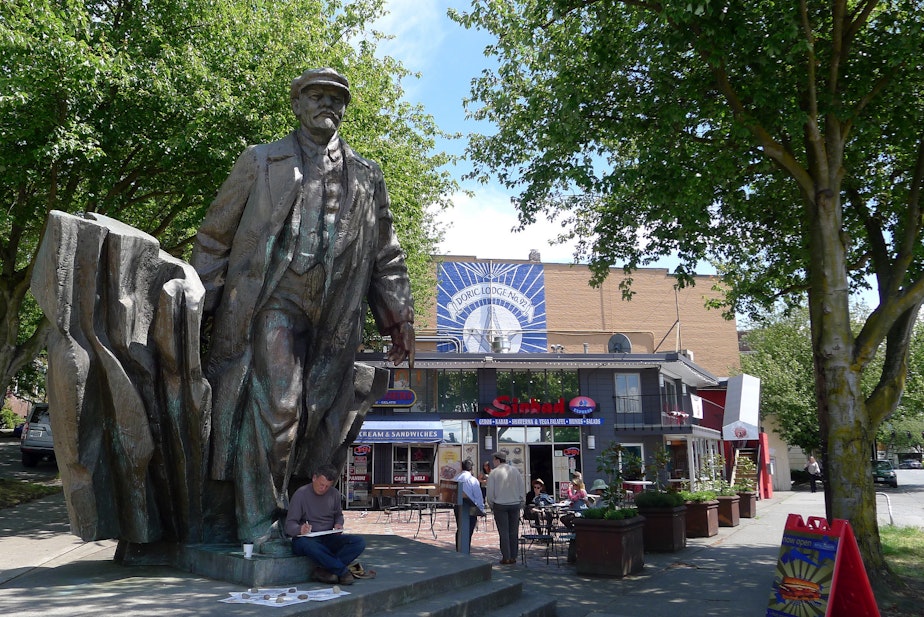Does the 'Soviet of Washington' deserve its lefty reputation?

Washington state and Seattle have a reputation as left-leaning – most recently because of the election of Socialist city council member Kshama Sawant and our adoption of the $15 an hour minimum wage.
But our lefty reputation is older than that. (Exhibit A: statue of Russian revolutionary Vladimir Lenin in Fremont.)
UW History Professor James Gregory told KUOW's Ross Reynolds about three key moments from our history – and whether we deserve this reputation.
Socialist state of Washington
Gregory begins with 1897 with Eugene Debs. Debs later became known for running for president as a Socialist, but before that Debs led a railroad worker strike and worked to replace the capitalist system.
Sponsored
He believed the best tactic would be to bring as many Socialists as possible to one state to win elections. He chose Washington because it had earned statehood only nine years earlier and was run by a radical populist governor.
Debs said he could recruit 100,000 unemployed workers from Chicago to convert Washington state to Socialism. Newspapers expressed alarm, and Debs lost interest, but the plan went forward in a smaller way. Three hundred Socialists moved to Bellingham and established Equality Colony, published a newspaper about winning state for Socialism, and set up Equality School.
Equality fell apart in 10 years.
On Whidbey Island, Socialists established Freeland and another settlement in Burley. Anarchists established a settlement called Home the on Kitsap Peninsula. Most of the settlements fell apart, but Washington became a center of activity for the radical union, the Industrial Workers of the World known as the Wobblies.
General strike of 1919
Sponsored
A union paper called on 60,000 Seattle union workers to strike on Feb. 5, 1919 in support of shipyard workers who were promised a raise by the federal government – that the shipyard owners reneged on. This came just two years after the Russian Revolution.
What followed was hysteria. Mayor Ole Hanson and newspapers warned strike meant revolution. Mayor Hanson armed 2,000 civilians. Fifteen hundred federal troops from Fort Lewis stationed in the city.
The strike committee set up its own safety committee, urging calm. Stores were cleared of food. There was a run on kerosene lamps because of fears that electric would go out. Some of Seattle’s wealthy left town.
Seattle came to a standstill. Nearly all businesses were shuttered. Twenty-one labor dining halls served meals to workers. Teamsters delivered milk and food.
Mayor Hanson wouldn’t concede and within a few days some unions defected from the general strike. After six days, the strike ended on Feb. 11. Hanson became a national celebrity, claiming he saved the city from Bolshevism.
Sponsored
Hansen quit his mayor's post to run for president and wrote a book “Americanism versus Socialism.” He made a lot of money and moved to San Clemente California where he became a real-estate developer in San Clemente.
Even though the Seattle General Strike didn’t achieve its goal, the story is told and retold in leftist circles as an example solidarity that inspired radicals in 30s and the new Left in 60s and 70s. There was even a 1985 rock opera about General Strike called “Seattle 1919” by a band called The Fuse.
Great Depression
Seattle was hit hard. Unemployment was at 35 percent at a time with no unemployment insurance.
Where Seattle's stadiums now stand was a homeless camp that housed up to 1,200 people.
Sponsored
A 1934 dock workers strike shutdown West Coast ports. This strike was successful in bolstering the power of radical and strong maritime unions.
In an article called “Circus Politics of Washington State,” lefty journalist Mary McCarthy included the phrase “47 states in the union and the soviet of Washington,” a phrase repeated over time that helped cement our leftist reputation.
So does Seattle and Washington deserve its leftist reputation? Maybe not, concludes Professor Gregory. He says unlike other parts of the U.S., the state has never been governed by radical leaders. And the leftism of our region pales in comparison with socialism in Europe.

